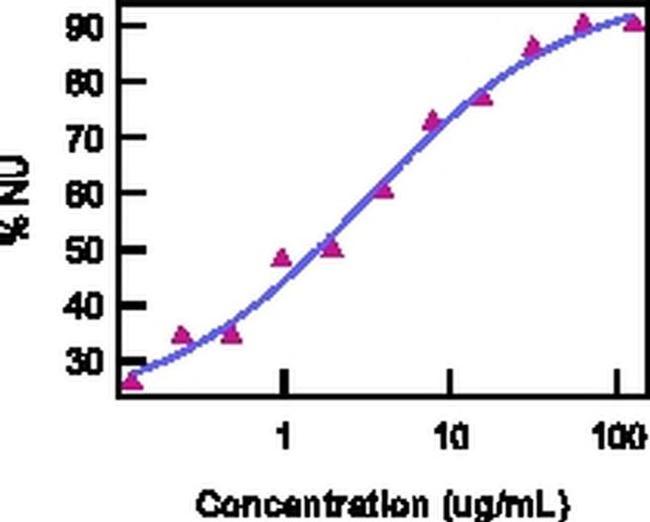Search Thermo Fisher Scientific
Invitrogen
IL-15 Monoclonal Antibody (ct2nu), Functional Grade, eBioscience™
Product Details
16-0157-82
Species Reactivity
Published species
Host/Isotype
Recommended Isotype Control
Class
Type
Clone
Immunogen
Conjugate
Form
Concentration
Purification
Storage buffer
Contains
Storage conditions
Shipping conditions
RRID
Product Specific Information
Description: The ct2nu monoclonal antibody reacts with human IL-15 and neutralizes its bioactivity. IL-15, or IL-T, is a 14 kDa proinflammatory cytokine and member of the IL-2 family. It plays a role in the development and maturation of macrophages and dendritic cells, and is essential to the proliferation and survival of NK cells and CD8^+ T cells.
IL-15 is expressed by antigen-presenting cells, epithelial cells, and stromal cells. IL-15 activates the Jak/STAT pathway through its heterotrimeric receptor. Two subunits of this receptor, the beta and gamma chains, are shared with the rest of the family, while the alpha subunit is unique to IL-15. In mice, the alpha chain is required to chaperone IL-15 from the ER to secretion. This chaperoning is not necessary in humans, and free IL-15 is detectable in human biological samples. However, the receptor-cytokine complex has been indentified in humans and demonstrates agonistic activity several-fold higher than IL-15 alone.
Applications Reported: The monoclonal antibody ct2nu reacts with and inhibits the bioactivity of human IL-15.
Applications Tested: The ND50 of this antibody, as measured by inhibition of proliferation in CTLL-2 cells, is 1-10 ng/mL in the presence of 0.5 ng/mL recombinant human IL-15. Neutralization dose will vary based on cell type, cytokine concentration, and assay method. This antibody should be carefully titrated for optimal performance in the assay of interest.
Storage and handling: Use in a sterile environment.
Filtration: 0.2 µm post-manufacturing filtered.
Purity: Greater than 90%, as determined by SDS-PAGE.
Endotoxin Level: Less than 0.001 ng/µg antibody, as determined by LAL assay.
Aggregation: Less than 10%, as determined by HPLC.
Target Information
IL-15 (Interleukin 15 ) is a cytokine that regulates T and natural killer cell activation and proliferation. IL-15 and IL-2 share many biological activities as both have been found to bind common hematopoietin receptor subunits, and may compete for the same receptor, and thus negatively regulate each other's activity. The number of CD8+ memory cells is shown to be controlled by a balance between IL-15 and IL-2. IL-15 induces the activation of JAK kinases, as well as the phosphorylation and activation of transcription activators STAT3, STAT5, and STAT6. In mouse, studies suggest that IL-15 may increase the expression of apoptosis inhibitor Bcl-xL, possibly through the transcription activation activity of STAT6, and thus prevent apoptosis. IL-15 plays an important role in the growth and differentiation of T and B lymphocytes, natural killer cells, macrophages, and monocytes as well as activation of a number of important intracellular signaling molecules. As such, IL-15 could be essential for the immune responses, allograft rejection, and the pathogenesis of autoimmune diseases. Further, IL-15 is a widely expressed pro-inflammatory cytokine and has been shown to play a role in several inflammatory disorders, including rheumatoid arthritis, psoriasis and pulmonary inflammatory diseases. Emerging data suggest that IL-15 may serve as a good therapeutic target, as there appears to be a beneficial effect of IL-15 neutralization in models of psoriasis and diabetes.
For Research Use Only. Not for use in diagnostic procedures. Not for resale without express authorization.
Bioinformatics
Protein Aliases: il 15; IL-15; ILN; Interleukin; Interleukin-15; Interleukin15; M-IL-15; MGC9721
Gene Aliases: IL-15; IL15
UniProt ID: (Human) P40933
Entrez Gene ID: (Human) 3600

Performance Guarantee
If an Invitrogen™ antibody doesn't perform as described on our website or datasheet,we'll replace the product at no cost to you, or provide you with a credit for a future purchase.*
Learn more
We're here to help
Get expert recommendations for common problems or connect directly with an on staff expert for technical assistance related to applications, equipment and general product use.
Contact tech support

